Workplace stress is often in the eye of the beholder.
Some people thrive under pressure from corporate management, for instance, while others avoid it at all costs. But low-key and monotonous jobs, such as assembly line factory work, can drive high-energy people bananas.

While different people may feel stressed for different reasons, the real issue is the impact this is having on a workforce. It’s undoubtedly much greater than many employers realize:
● By their own admission, financial pressures impede the job performance of nearly one out of four employees, while almost as many employers report substantial losses in productivity as a result.
● As many as 24% of American workers say they experience distractions at their jobs due to personal financial issues, according to a 2014 PricewaterhouseCoopers survey on Employee Financial Wellness.
● Stress over finances at the workplace affects 60% of younger millennial workers—those born in the early 1980s through the early 2000s.
● High-earning individuals making $100,000 a year or more also report experiencing financial stress at work, busting the myth that this only affects low-income, unskilled employees.
Employees distracted by financial pressures end up costing companies in several ways, and the impact on business earnings can be quite severe. Heightened levels of anxiety hurt morale and prevent workers from producing at maximum efficiency; medical expenses and time off due to stress-related injuries and illnesses are another drain on profitability.
Absenteeism due to financial problems is yet another costly issue. Approximately one out of five workers report having left work early or missing work altogether to deal with personal financial problems. In short, the number of employed Americans suffering some form of financial stress is large and growing, and this is detracting from their job performance and hurting their employer's bottom line.
How advisers can help
Employers are in a challenging position when it comes to mitigating the stress experienced by their employees. They require a high-performing workforce, yet financial illiteracy and poor financial decisions result in stressful situations that undercuts their employees’ performance. The message that advisers need to send to their employer clients is that by providing financial education and assistance programs for their employees can bolster their bottom line.
It has been demonstrated time and again that when employees receive education and assistance with their financial affairs—such as how to create a budget, manage debt and increase their savings—they do a better job of overcoming their financial hurdles are generally happier both at home and at work.
Financial literacy programs that are designed to meet employees’ most pressing needs also lead to greater retirement plan participation—addressing yet another enduring source of employee stress. The more support employees receive in these areas, the faster the process unfolds—and the sooner employers will realize better workplace productivity and a corresponding increase to their bottom lines.





